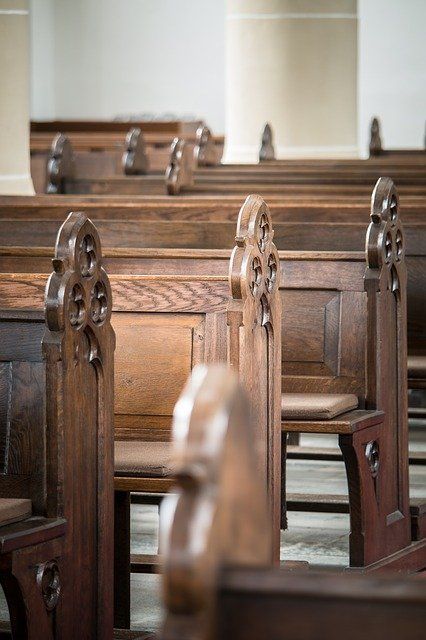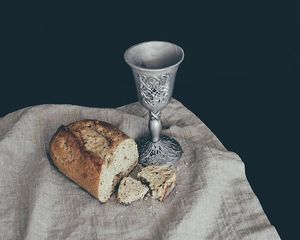For we, being many, are one bread and one body’ (1 Corinthians 10:17)
No Christian is called to be a religious ‘lone ranger’. True communion with Christ carries with it a desire to commune with fellow believers in the church, which is the ‘body of Christ’. There is a transition from the bread as a symbol of Christ’s physical body (1 Corin-thians 10:16) to the church as a whole as the body of Christ (v. 17). Christ’s body is broken so that those he saves may be melded into one body in him. In terms of the symbolism of the Supper, the bread, which is the Redeemer, is broken to make the redeemed a single loaf.
Going it alone
The Lord’s Supper, then, is not an exercise in individualism. You will often hear people say that their faith is a matter between them and God. This is how they excuse their unwillingness to discuss what they believe, or justify their not joining a church. They have no desire to submit to the guidance of pastor and elders, or be accountable to their brothers and sisters in Christ for the consistency (or otherwise) of their lives as professing Christians.
Let it be said, clearly and unequivocally, that the Bible nowhere allows the view that faith is exclusively a matter between God and you. This is a self-serving modern myth. It denies the essential corporate element in the approval, conduct and growth of Christian faith and life. In Scripture those who ‘go it alone’ invariably go wrong. People can ‘go it alone’ in groups, of course. Ananias and Sapphira did things their way, just as truly as did Simon Magus. The issue is not the number of people involved, but the rôle of the church. The Corinthian factions refused to submit to the corporate imperatives of Christian faith and life. Hence the apostle emphasises the church as a body, with different inter-dependent parts (1 Corinthians 12).
Three parties
The corporate dimension in the Lord’s Supper is clearly set forth in 1 Corinthians 10, which tells us that there are three parties involved: God in Christ; the believer; and other believers. It is not a case of ‘him and me’, but of ‘him, me and you (plural)!’ This is why the Lord’s Supper is given to the church to administer, and not to the individual Christian. You cannot administer the Supper to yourself, neither can you admit yourself to the Table. Why not? Because it is given to the church as a whole, for the deepening of spiritual growth and fellowship with Christ in the body as a whole. The Lord has given its administration to the church, with God-appointed elders who either admit or refuse individuals on the basis of the credibility of their profession and the consistency of their walk. ‘For we, though many, are one bread and one body; for we all partake of that one bread’. The Supper is an ordinance of the visible church, not of individuals who decide that they will participate. It is corporate in nature and is an act of communion with fellow-believers in the context of the Christ-instituted church.

What is a church?
This implies that we recognise and exercise the common bond that binds together all who believe in the Lord Jesus Christ and are saved by his grace. The Christian is not one island in an archipelago called the church. He is a contiguous part of a single territory, whose builder and maker is God. Although there is an invisible aspect to the church, in that it comprises people both on earth and in heaven, and individuals scattered among different churches, there is no such thing as a meeting of the invisible church. Thus there can be no such thing as a sacrament of the invisible church.
Whatever its size, the church exists wherever Christ has called together a people, and they are organised with a plurality of elders raised up by him. A family is not a church. A hermit is not a church. A collection of individuals is not a church. A church is a body, where there are members who acknowledge themselves for what they are, and submit to Christ and to one another in terms of the gifts, graces and ministries he has given them.
Individuals who attend a church, but hold aloof from commitment to that body and submission to the elders, are simulating church membership. They are ‘playing church’ and, in effect, reserving to themselves the authority that is Christ’s and that Christ has given to his body. The Lord’s Supper is, among other things, the place where believers practise recognition of their brothers and sisters in Christ, and commit themselves to grow in mutual submission as members one of another (12:27).

Searching questions
This calls us to review in our hearts our relationships with our brothers and sisters in the church; not the church in some etherial cosmic sense, but the actual church where we worship. Face the implications directly and personally. Do you love the people in the congregation where you worship? Do you know an appreciable number of them? Is that church a place you go to satisfy your sense of obligation or need to worship God? Or is it a body of which you desire and love to be a part? Are there unrepented sins and unresolved obstacles between you and others in that fellowship? Are you seeking reconciliation, as directed in Matthew 18:15-20, or do you just avoid these folk and keep to your comfortable clique of pals and buddies? Are you committed to building enduring bonds of friendship and fellowship with fellow-Christians? Can you expect Christ to commune with you, if your answers to these questions are at variance with his known will?
Anyone who is content to keep aloof from the life of the body, either by despising other Christians or denying the authority and leading of the church through her ministers and elders, has no promise from the Lord of blessing at the Table. That is a hard saying but an inescapable truth. Those who desire to come to the Lord’s Table and enjoy the blessing of the Lord will already be living in communion with the Lord and in fellowship with his people. Where there are problems, they are committed to resolving them through the means the Lord has given to the church.
Looking forward to glory
Because Christians glory in the cross (Galatians 6:14), they love to come to Christ together. They draw great encouragement from the unity that grows in, and even through, their very diversity. They delight in the way Jesus blesses other believers. They praise God for the communion of the saints and look forward to glory, when heaven will be filled with brothers and sisters in Jesus Christ. There, made perfect in holiness, they will enjoy the unclouded communion of the eternal marriage-supper of the Lamb, who was slain to take away the sin of the world. The Lord’s Supper here on earth reminds us of these things, and quickens our anticipation of ‘the glory that shall be revealed in us’ (Romans 8:18).









